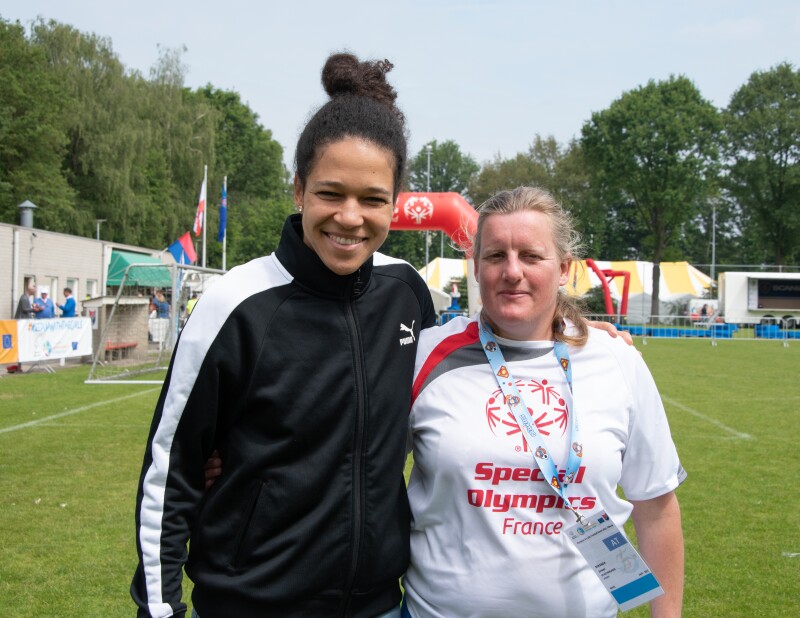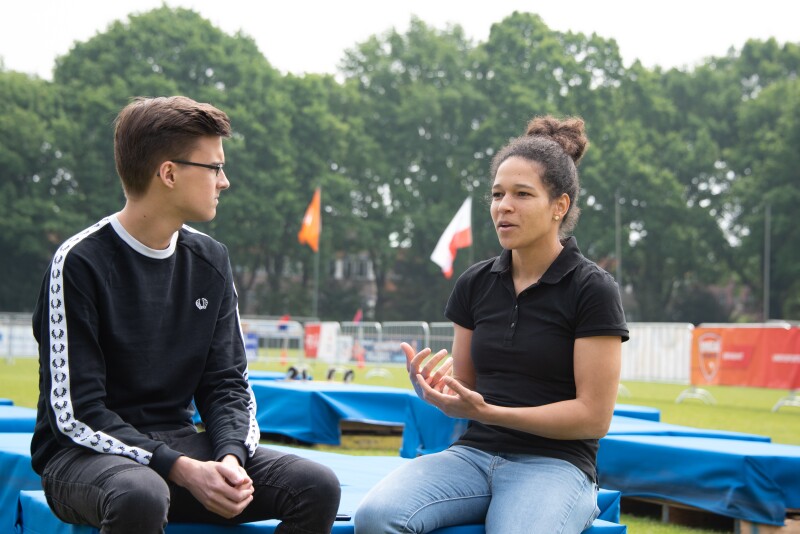Célia Šašić, two-time UEFA Women’s EURO winner eagerly watched one of the final matches of the Special Olympics European 8-a-side Football Tournament between France and Poland from the sidelines. Former German international Šašić had travelled from Bonn, Germany to SVG Tilburg on a quest to promote and help develop women’s football.
In her role as UEFA ambassador, Šašić shares her knowledge and experience at a range of development tournaments and football events across Europe, acting as a role model and inspiring women and girls with and without intellectual disabilities to play football.
AIPS sat down with Šašić on the sidelines in Tilburg to discuss the tournament, her role as an ambassador and the importance of the Special Olympics ‘Keep Up With the Girls’ campaign to get women and girls with and without intellectual disabilities involved in football.
What does it mean for you personally to be a UEFA ambassador and visit events such as the one here in Tilburg?
With my experience as a professional football player, I would like to share the lessons I have learned throughout my career. I want to give back to football what is has given me, a sense of joy you can only experience from playing this beautiful game yourself. That is why I believe this is such a fantastic event, as it allows players to come into contact with women and girls from different backgrounds and nationalities. Football connects, it just works that way.
The ‘Keep Up With The Girls’ campaign, as part of the European Football Week 2019, aims to show every girl deserves the opportunity to play football. What is your take on it?
I have seen the hashtag and some of the social media efforts, it is a great way to bring people together and make women and girls—with or without intellectual abilities—feel that they are part of a group with shared interests and a passion for football. Well-known football players are also taking part in this campaign, to show football is a sport for all. The players who will be receiving a medal at the end of this event will experience the same emotions as I did when I got my Champions League medal. Which is beautiful to see, as this event will hopefully stay with them forever.
For me every tournament, from the World Cup in Germany back in 2011 to the Champions League final in 2015, has its own story attached to it. Not only because of the stuff that happened on the pitch, but also when traveling to venues or at the team hotels. All players from all levels should be given the opportunity to have fun while playing football.

Your former teammate Nadine Kessler once said her mother has always been her role model. To whom did you look up to during your professional career?
Growing up I did not have any female role-models to look up to, at least when it comes to football. So, I watched the likes of Zinedine Zidane and David Beckham play and had posters of them on my wall. At that time I did not even know a Bundesliga for female players existed to be honest. The media did not pay any attention to it. But nowadays I see more and more girls walking around with names such as Marta, Marozsán or Martens on the back of their jerseys. That shows how far we have come already and with the upcoming World Cup in France I can only see the women’s game growing.
UEFA has recently launched a dedicated women’s football strategy for the first time in its history. What changes in women’s football would you like to see become a reality by 2024?
I was very happy to hear UEFA launched such a detailed plan and strategic framework. I read it with great interest and felt very excited about the outlined goal to double the number of women and girls playing football. The possibility to play football can be rewarding in so many ways, being part of something bigger than yourself makes you feel valued and appreciated. That really is the best possible feeling. And even though it will be challenging to reach all goals, it makes me feel proud that UEFA is really trying to empower the women’s game. I believe that the challenges we will be facing are only going to make us better.
What advice would you like to give women and girls—with and without intellectual disabilities—when it comes to playing football?
For me, the most important thing has always been to let nobody take your joy in playing football away. Nobody can tell you what to do, so try to surround yourself by people with a positive mindset and ignore the haters. Just go out there and play.











